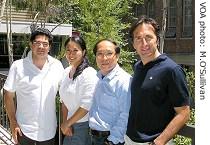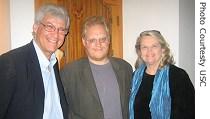-
(单词翻译:双击或拖选)
Los Angeles
05 July 2007
In this information age, governments are reaching out to people in other parts of the world in an emerging field called public diplomacy1. Mike O'Sullivan reports, mid-career officials from government and international institutions recently came to Los Angeles to sharpen their skills in the field.
Public diplomacy involves some very different methods of outreach. Joe Wang, senior consul2 at the Taipei Economic and Cultural Office in Los Angeles, is one of 15 mid-career professionals who took part in a two-week program at the University of Southern California Center on Public Diplomacy. He says that winning hearts and minds is part of public diplomacy, and he quotes a saying by the Chinese philosopher Sun Tzu, author of the classic "Art of War."

(From left) Jose Manuel Bassat, Soung-ah Choi, Joe Wang, Leonardo Mazzei 05 July 2007
"It means 'It is better to win people's hearts than to conquer their cities.' So from there, we can understand the major concept of promoting public diplomacy in a host country is to engage in direct dialogue," Wang said.
Wang says his work as a diplomat3 involves showing photo exhibits of Taiwan's scenic4 attractions, giving speeches to civic5 groups, and organizing academic and cultural exchanges.
University of Southern California professor Nicholas Cull6 says public diplomacy can entail7 advocating policies, but often it does not.
"It doesn't have to be about advocacy. It doesn't have to be about telling people things," he said. "An important part of public diplomacy is listening to other nations, and, in fact, I would say that is where your public diplomacy should begin, with proper listening."
Communications analyst8 Eytan Gilboa teaches at Israel's Bar-Ilan University and at USC. He says public diplomacy may involve promoting a national image, or creating open forums9 for the sharing of ideas, a process facilitated by new technologies.
"For example, the Internet provides ample opportunities for creating dialogues with peoples around the world. We call it cyber-public diplomacy," Gilboa said.
Leonardo Mazzei, a communications officer for the World Bank, says the new cyber-technologies have helped the outreach of institutions like his, but he says the new technology has its limits.
"I think it's very good to keep in mind that new technologies are still in the world a privilege to a few, and not to many," Mazzei said. "And I think it's good to keep that in mind when we put in perspective the IT [information technology] boom, if you will, and make sure that it's not only about the technology. It is also about the humans that are interacting with the technology."
International broadcasting is an established means of outreach by national governments, and many have added television and Internet components10 to their older radio services. Soung-ah Choi, associate spokesperson for the United Nations secretary-general, says radio remains11 an important medium, even in this multimedia12 age. She says that long-distance shortwave broadcasts are especially important in the developing world.
"At the United Nations we deal with every country in the world," Choi said. "And in this, shortwave is very important because we know that a quarter of the world does not get anything else but shortwave radio. And it is essential for those people in these regions to have that source of information. And that is one of the reasons that the U.N. itself has a radio."
The United Nations broadcasts in regional languages in Africa, Latin America and South Asia.
 |
| (From left) Geoffrey Cowan, Nicholas Cull, Public Diplomacy program participant Aileen Adams 05 July 2007 |
He says public diplomacy explains a government's positions, but does not always make them popular.
"What we're learning about, I hope, in this public diplomacy program, is not to spin a country so that it's popular, but to understand all the elements of it," Cowan said. "And where the accurate representation is not a good one, to then go back to the people in those countries and say, maybe our country has some problems that we ought to deal with."
Jose Manuel Bassat of the World Bank says public diplomacy strives to bring people together in a world that is getting smaller.
"Now that it's much easier in many count
 收听单词发音
收听单词发音
1
diplomacy

|
|
| n.外交;外交手腕,交际手腕 | |
参考例句: |
|
|
|
2
consul

|
|
| n.领事;执政官 | |
参考例句: |
|
|
|
3
diplomat

|
|
| n.外交官,外交家;能交际的人,圆滑的人 | |
参考例句: |
|
|
|
4
scenic

|
|
| adj.自然景色的,景色优美的 | |
参考例句: |
|
|
|
5
civic

|
|
| adj.城市的,都市的,市民的,公民的 | |
参考例句: |
|
|
|
6
cull

|
|
| v.拣选;剔除;n.拣出的东西;剔除 | |
参考例句: |
|
|
|
7
entail

|
|
| vt.使承担,使成为必要,需要 | |
参考例句: |
|
|
|
8
analyst

|
|
| n.分析家,化验员;心理分析学家 | |
参考例句: |
|
|
|
9
forums

|
|
| 讨论会; 座谈会; 广播专题讲话节目; 集会的公共场所( forum的名词复数 ); 论坛,讨论会,专题讨论节目; 法庭 | |
参考例句: |
|
|
|
10
components

|
|
| (机器、设备等的)构成要素,零件,成分; 成分( component的名词复数 ); [物理化学]组分; [数学]分量; (混合物的)组成部分 | |
参考例句: |
|
|
|
11
remains

|
|
| n.剩余物,残留物;遗体,遗迹 | |
参考例句: |
|
|
|
12
multimedia

|
|
| adj.多种手段的,多媒体的;n.多媒体 | |
参考例句: |
|
|
|
13
repercussions

|
|
| n.后果,反响( repercussion的名词复数 );余波 | |
参考例句: |
|
|
|















